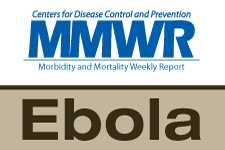Questions and Answers: 2014 Ebola Outbreak
General
How do I protect myself against Ebola?
For general information about Ebola, please use the links below:
- Avoid contact with the blood and body fluids (such as urine, feces, saliva, sweat, urine, vomit, breast milk, semen, and vaginal fluids) of any person, particularly someone who is sick.
- Do not handle items that may have come in contact with an infected person’s blood or body fluids.
- Do not touch the body of someone who has died from Ebola.
- Do not have contact with the semen from a man who has recovered from Ebola (for example, avoid having oral, vaginal, or anal sex).
- Do not touch bats and nonhuman primates (apes and monkeys) or their blood and fluids and do not touch or eat raw meat prepared from these animals.
- Avoid facilities in West Africa where Ebola patients are being treated. The U.S. Embassy or consulate is often able to provide advice on healthcare facilities that are suitable for your medical needs.
Although there is believed to be no risk of Ebola to travelers in Guinea, Liberia, and Sierra Leone, travelers should, as usual, avoid contact with sick people, dead bodies, or blood and body fluids. For more information for travelers, visit CDC’s Travelers’ Health Ebola web page.
Has the first patient to become sick in this outbreak, known as “patient zero” been identified?
Reports in the medical literature and elsewhere have attempted to identify the patient who might have been the initial person infected in the West Africa Ebola outbreak. It’s important for CDC to learn as much as it can about the source and initial spread of any outbreak.
With regard to the West Africa Ebola outbreak, tracing the lineage of how Ebola has spread thus far can help CDC apply that knowledge toward better prevention and care techniques. The knowledge gained in this work might entail details about specific patients. CDC generally refrains, however, from identifying particular patients in any aspect of an outbreak.
What is CDC doing in the United States about the outbreak in West Africa?
CDC has activated its Emergency Operations Center (EOC) to help coordinate technical assistance and control activities with partners. CDC has deployed several teams of public health experts to the West Africa region.
Before the Ebola outbreak in West Africa, CDC had protocols in place to protect against spread of disease in the event that an ill traveler arrived in the United States. These protocols include having airline crew notify CDC of sick travelers on a plane before arrival, evaluation of sick travelers, and isolation and transport to a medical facility if needed. CDC, along with Customs and Border Protection, has also provided guidance to airlines for managing sick passengers and crew and for disinfecting aircraft. CDC has issued a Health Alert Notice reminding U.S. healthcare workers about the importance of taking steps to prevent the spread of this virus, how to test and isolate patients with suspected cases, and how to protect themselves from infection. In response to the Ebola outbreak in West Africa, CDC and Customs and Border Protection are working together to conduct enhanced entry screening at U.S. airports. See the Screening and Monitoring Travelers to Prevent the Spread of Ebola fact sheet for more information.
Travelers
What is being done to prevent sick travelers from arriving in the United States?
Widespread transmission of Ebola in West Africa has been controlled, although additional cases may continue to occur sporadically. However, because of ongoing surveillance and strengthened response capacities, the affected countries now have the experience and tools to rapidly identify any additional cases and to limit transmission.
During Travel and Arriving in the United States
CDC works with other federal agencies, state and local health departments, and the travel industry to identify sick travelers arriving in the United States and to take public health actions to prevent the spread of communicable diseases. CDC has staff working at 18 border public health field offices located in international airports and at land borders. These staff are ready at all times to investigate cases of sick travelers on planes and ships entering the United States.
Airlines are required to report any deaths onboard or sick travelers meeting certain criteria to CDC before arriving into the United States, and CDC and its partners determine whether any public health action is needed. If a traveler is infectious with a serious contagious disease during a flight, CDC conducts an investigation of exposed travelers and works with the airline, federal partners, and state and local health departments to notify these travelers and take any necessary public health action. When CDC receives a report of a sick traveler on a cruise or cargo ship, CDC officials work with the shipping line to make an assessment of public health risk and to coordinate any necessary response.
What do I do if I am traveling to an area where the outbreak occurred?
Widespread transmission of Ebola in West Africa has been controlled, although additional cases may continue to occur sporadically. Travelers to countries that experienced outbreaks of Ebola should, as usual, avoid contact with sick people, dead bodies, blood, and body fluids. For more information, visit CDC’s Travelers’ Health Ebola webpage.
Should people traveling to Africa be worried about Ebola?
Ebola was reported in multiple countries in West Africa (see Affected Countries).
CDC no longer recommends that U.S. residents avoid nonessential travel to Guinea, Liberia, or Sierra Leone. Although there is believed to be no risk of Ebola to travelers in these countries, travelers should, as usual, avoid contact with sick people, dead bodies, or blood and body fluids. You can find more information on travel notices on CDC’s Travelers’ Health Ebola webpage.
Ebola is a very low risk for most travelers—it is spread through direct contact with infected blood or other body fluids, so travelers can protect themselves by avoiding sick people, body fluids, and facilities in West Africa where patients with Ebola are being treated.
In the United States
Did people in the United States get Ebola during the outbreak?
Two imported cases, including one death, and two locally acquired cases in healthcare workers were previously reported in the United States. On September 30, 2014, CDC confirmed the first travel-associated case of Ebola (the index case) to be diagnosed in the United States in a man who had traveled from West Africa to Dallas, Texas, and later sought medical care at Texas Health Presbyterian Hospital of Dallas after developing symptoms consistent with Ebola. That patient passed away from Ebola on October 8, 2014.
Two healthcare workers who had cared for the index patient at Texas Health Presbyterian tested positive for Ebola on October 10 and 15, 2014, respectively. Both of these healthcare workers have recovered and were discharged from the hospital.
On October 23, 2014, a medical aid worker who volunteered in Guinea was hospitalized in New York City with Ebola. The diagnosis was confirmed by CDC on October 24, 2014. The patient has recovered and was discharged from Bellevue Hospital Center on November 11, 2014.
CDC and public health officials worked to identify people who had close personal contact with these patients, and healthcare professionals were reminded to use meticulous infection control at all times. To date, all contacts of the Ebola patients in the United States have completed the 21-day monitoring period.
Is there a danger of Ebola in the United States?
Ebola is not spread through casual contact; therefore, the risk of an outbreak in the United States is very low. We know how to stop Ebola’s further spread: thorough case finding, isolation of ill people, contacting people exposed to the ill person, and further isolation of contacts if they develop symptoms. The U.S. public health and medical systems have had prior experience with sporadic cases of diseases such as Ebola. In the past decade, the United States had 5 imported cases of Viral Hemorrhagic Fever (VHF) diseases similar to Ebola (1 Marburg, 4 Lassa). None resulted in any transmission in the United States.
Why don’t we restrict travel to the United States?
Widespread transmission of Ebola in West Africa has been controlled, although additional cases may continue to occur sporadically. However, because of ongoing surveillance and strengthened response capacities, the affected countries now have the experience and tools to rapidly identify any additional cases and to limit transmission.
Is there a surveillance system for Ebola survivors in the United States?
There is no formal surveillance system for Ebola survivors in the United States. We have been advising survivors to pay attention to their health and to closely monitor for Ebola-like symptoms. Because there is evidence that male Ebola survivors can have infectious virus present in their semen, we advise that people avoid contact with semen from male survivors or use condoms for any type of sexual activity.
We are continuing to investigate the possible risk of sustained presence of Ebola virus in body fluids after recovery, and will update guidance for survivors, healthcare workers, and the public as we learn more.
- Page last reviewed: February 18, 2016
- Page last updated: February 18, 2016
- Content source:




 ShareCompartir
ShareCompartir